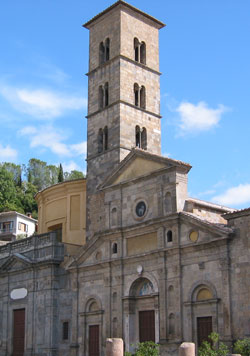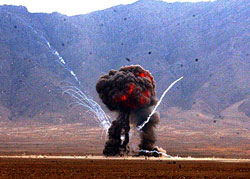|
|
|
 Basilica of Santa Cristina, Italy (XII century)
Each of the above time periods was brought upon by many determining criteria. Wars, politics, how the economy evolves, and other events that devour our immortal beings and existences, gives the artist, scientists and musicians alike a reason to rethink how their work should be created or viewed. Factors from major events take seed into the subliminal minds of all cultures from around the world, seize and shake the earth like a weak tree caught in a furious tornado.
From the musician’s standpoint, let us examine two separate time periods to gain the understanding of the evolution and it’s developmental process. Let us take the Classical period and the Romantic period. During the Classical period, events like the Declaration of Independence (1776), the French Revolution and the war of 1812 influenced the great minds of that time. The Romantic period consisted of the European revolutions, the Civil war and the American wave of the Gold Rush. Beethoven was a crossover figure, which ended one period and began another (and there are artists in this period who may do the same). We all know the “Eroica” story, of how he crossed out this word from the title of this symphony, after he found out Napoleon wanted to take over all of France. Events like this, are spread by osmosis and absorbed through the artist’s eyes/ears and transported through the brush, pen or computer.
 Ludwing van Beethoven
 Wars contribute to the retrogression
The wars aren’t the only contributing factors. If you look at the other periods of times, you will clearly see that the financial state has its hooks in the problem too. Because of finances, people loose out on many aspects as well. An example of this in today’s culture might be; how the department of education creates a budget cut of all of the arts within a community. Let us use Providence, the city where I live, in Rhode Island and the loss of its music program as an example of this misfortune. The students have no say in the matter, the parents are not fighting hard enough or they do not know the “right person,” to rectify this situation. When they do fix the situation, it will certainly be a temporary band-aid and the problem will resurface once again. Because of this viscous cycle, the students of the future will become nothing but math, science and English robots that will lack any imagination. Students have nowhere to turn because; there is no creative outlet for them to turn to. This lack of imagination has already trickled into the music of our pop cultured music as well as all of the other sources that we have come to trust in the past. The harmonies of our compositions, use of instruments and use of technology have all become this wash of blends (some slowly reverting back to the basics) that all have begun to sound the same and go unnoticed because they have become this background noise to divert our attention. When was the last time you heard someone say, “Wow, I just heard a great new Opera that was written this Century!” Or, “There is a great new composer that is in the papers and television all the time and has really captured our attention.” I would even settle for “That artist makes me feel great inside and really touches my imagination or curiosity.”
It should be noted that war and the decline of ones economy are not the only reasons why this new period is called the “Age of Retrogression.” Perhaps the lack of religion (the corruption that riddled throughout the churches and temples) and the breakdown of the family values were the kindling that the fire needed to burst into flames to begin with.
 Norman Rockwell
Related resources:
The contents, views and opinions in this article are those of its author.
|
|
|
|
|
|